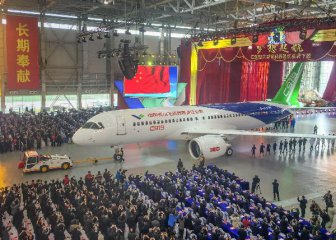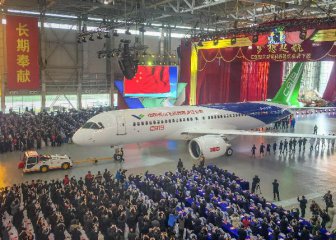
China made aviation history Monday, when its first domestically-produced large passenger aircraft was unveiled in Shanghai. The C919 plane was developed by the Commercial Aircraft Corp. of China(COMAC).
When it is cleared for commercial use, it is expected to compete with the updated Airbus 320 and Boeing's new-generation 737. C919 has 158 seats, a standard range of 4,075 kilometers and an extended range of 5,555 kilometers.
With its maiden flight scheduled for next year, however, and at least another three years of test flights, it will take some time before the single-aisle jet can fly commercial air routes the world over.
China is the world's largest civil aviation market, with its 21 largest airports seeing annual throughput exceeding 10 million passengers and a fleet of over 3,000 aircraft, which is dominated by Boeing and Airbus.
COMAC said it had already accepted 517 orders from 21 foreign and domestic customers. The version unveiled Monday is the basic model, and COMAC said it has extended, shortened, cargo and business versions in the pipeline, too.
In addition, this new-generation jet will have flexible cabin designs to suit different airlines. The C1919 is the result of seven years of hard work by a group of 200 aircraft component manufacturers and research teams with 36 higher-learning institutes from 22 provinces and municipalities in China.
More than 30 foreign firms including GE and Honeywell have supplied components for the C919 aircraft and over 200,000 technicians were involved throughout the production cycle. "The aircraft uses the very best of domestic and foreign resources, and was designed and made in accordance with international standards," said C919 chief designer and COMAC deputy general manager, Wu Guanghui.
C919 will use 13 to 15 percent less oil compared with its current competitors, said Wu. COMAC chairman Jin Zhuanglong said the aircraft featured 102 new applications of technology and materials, including third generation aluminum-lithium alloy materials, which were used for the body.
"Safety is our top priority. Tests will cover avionic, flight control, hydraulics and airborne systems," he said, adding that six C919 jets would all be put through the vigorous test flights.
Honeywell was brought onboard as a consultant to help with safety, reliability and efficiency standards, according to Briand Greer, president of Honeywell Aerospace Asia Pacific.
"It is quite understandable that China wants to gain a foothold in such a strategic industry," said Chen Juming, Airbus China president and CEO.
The aviation market is so vast that there is plenty of room for another manufacturer, said Chen. Chen believes COMAC can establish itself as a strong competitor. Before C919, China has proved its aviation manufacturing acumen, despite failing to exploit products to their full commercial potential.
The country developed its first large passenger aircraft, the Y-10, a four-engine narrow-body jet airliner in the 1970s. The plane, which sat 149 in economy, had a successful test flight on Sept. 26, 1980, and visited a number of Chinese cities, including the plateau city of Lhasa in the Tibet Autonomous Region.
Unfortunately, the project was canceled in 1985 due to viability and budgetary reasons. At that time, China had already opened up and had a modest fleet of Western-produced aircraft. China resumed the pursuit of its aircraft dream in 2008 when COMAC produced the ARJ21-700 regional jet, China's first airliner independently designed in accordance with international standards.
The 5-seat per row jet was awarded airworthiness certificates from both the Civil Aviation Administration of China and U.S. Federal Aviation Agency. The ARJ21-700 underwent six-years of grueling tests before the civil aviation authority awarded it accreditation in 2014.
COMAC has proven experience of airworthiness testing, this will make the process for the C919 much easier, said Wu. "It took COMAC 7 years to make sufficient design, calculation and tests," said Wu. "I have great confidence in C919 and I am willing to be the first person aboard," he said.




















Latest comments